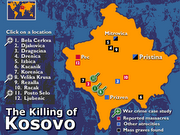Roundup: NATO defense ministers meet to discuss missile defense, Kosovo issue
The defense ministers from 26 NATO allies met in Brussels Thursday to discuss primarily missile defense and the alliance's role in Kosovo and Afghanistan.
The ministers are expected to agree to look seriously into the implications of the U.S. proposal to base interceptor missiles and a radar station in Poland and the Czech Republic.
"On missile defence we're hoping that they will take a specific decision so that future work on a possible future NATO missile defense system will take into account the implications of the U.S. proposals to base interceptors in Poland and radars in the Czech Republic," NATO Assistant Secretary General John Colston told reporters before the meeting.
"It's quite possible that the United States' capability could be one complementary element of our approach to missile defense in the future. This would not bring the U.S. system under NATO control, but it recognizing that the United States' system would be likely to provide a very substantial degree of coverage of the European continent, and therefore it does make sense for us to examine the U.S. system alongside possible potential future NATO elements," he added.
But he cautioned that no decision is to be made immediately on whether NATO will pursue its own strategic missile defense system.
"But let me say no decision is being taken now and no decision is expected in the near future on whether or not NATO would want to proceed with its own missile defense system. That is a decision for the future."
The U.S. has said that its defense system's deployment in Eastern Europe will cover most of Europe from ballistic missile attacks. But Turkey and parts of Romania, Bulgaria and Greece will not be covered as those areas are too close to the potential sources of missile attack.
NATO Secretary General Jaap de Hoop Scheffer on Thursday stressed the indivisibility of the security of allies, which means all allies must have the same protection.
"NATO's approach (to missile defense) is based on the principles of the indivisibility of allied security and transparency with our partners, of course including Russia," de Hoop Scheffer said in opening remarks on Thursday.
The NATO defense ministers will also have an opportunity to debate the U.S. plan with Russia's new Defense Minister Anatoly Serdyukov.
Russia is strongly opposed to the U.S. plan.
Colston refused to comment on Russian President Vladimir Putin's recent proposal to have a joint radar site located in Azerbaijan, saying it is far too early for technical evaluation.
But he welcomed the fact that Russia seems to be moving on "from the rhetoric of confrontation to the rhetoric of cooperation."
The defense ministers are also expected to emphasize the alliance's commitment to Kosovo. NATO has a 16,000-strong force in the Serbian province.
Colston said the alliance is still hopeful that the UN Security Council can reach a resolution on Kosovo's status.
"As to speculation about what would happen if a Security Council resolution was not reached, let me first of all say there is as yet no Russian veto. We've all heard the words that have come from some Russian leaders, but there is no Russian veto as yet and we're continuing to work and will continue to work over the coming days and weeks to see if we can reach a negotiated settlement," he said.
He said the alliance is closely watching the situation in Kosovo and is prepared for all eventualities.
"Everyone in Kosovo needs to be aware of NATO's determination to maintain security in Kosovo and that we will not tolerate threats from whatever quarter to such security," he added.
"We are therefore determined to maintain our mission; to maintain it effectively; and to ensure that the security of Kosovo is maintained for the benefit of all its inhabitants until such time as we hope we can transition to a new status under a new resolution in providing the international military presence in Kosovo," Colston said.
On Afghanistan, the ministers are expected to look into ways to ensure that the NATO-led International Security Assistance Force will have the capacity and flexibility to carry out its tasks. They will also discuss ways to reduce civilian casualties in clashes with the Taliban.
The ministers will also discuss NATO's rapid reaction force and hold consultations with NATO's partners.
Source: Xinhua
Subscribe to:
Post Comments (Atom)


No comments:
Post a Comment